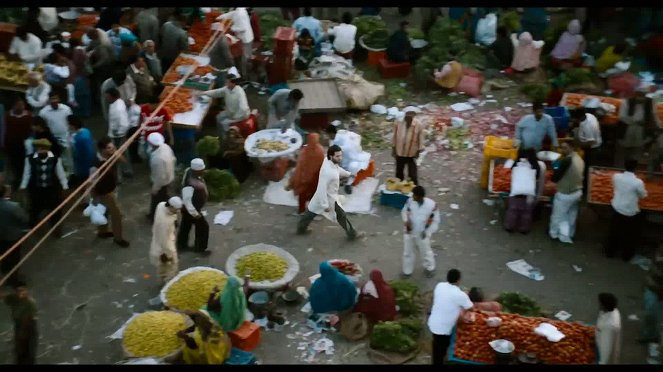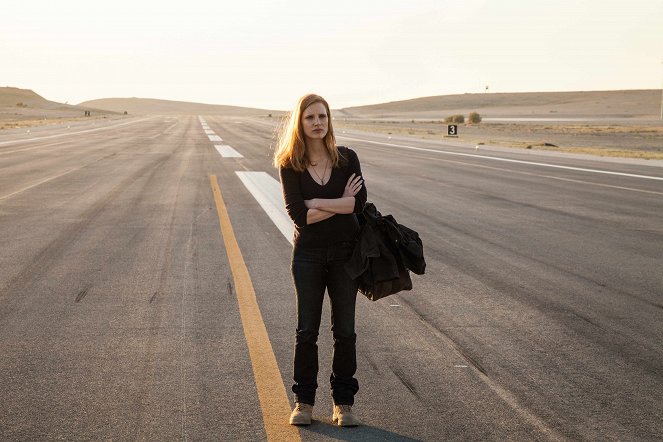Directed by:
Kathryn BigelowScreenplay:
Mark BoalCinematography:
Greig FraserComposer:
Alexandre DesplatCast:
Jessica Chastain, Jason Clarke, Joel Edgerton, Jennifer Ehle, Mark Strong, Kyle Chandler, Edgar Ramirez, James Gandolfini, Chris Pratt, Callan Mulvey (more)VOD (4)
Plots(1)
Kathryn Bigelow directs this military action thriller about the mission by American special operations forces to capture or kill al-Qaeda leader Osama bin Laden. Shining a light on the secretive processes behind the world's greatest manhunt, the film details the work done by the intelligence team responsible for finally tracking down bin Laden, graphically documenting the unfolding ten-year intelligence hunt through the eyes of CIA analyst Maya (Jessica Chastain), whose initial minor role assumes ever-greater importance as a crack US Navy Seal team readies itself for its most important mission ever. (Universal Pictures UK)
(more)Videos (4)
Reviews (17)
The unreservedly enthusiastic overseas reviews didn't lie, it's a blast. What’s impressive is that the slickest films in A-list Hollywood today are being made by a woman. And I'd like to hear what 'Klaus's Rasputin', the insane Chancellor Hájek, would say about this film, given his popular opinion (one of the many pearls this alien entity has spat) that Osama Bin Laden was a fabrication. It could be fun…
()
SPOILERS AHEAD. Like Fincher’s Zodiac, Zero Dark Thirty is another long detective story without a satisfying conclusion. Though the perpetrator is apprehended after a long and exhausting manhunt, neither the main character nor the viewer gets much satisfaction from that. In the last shot, Maya gives vent to her emotions after several years of drudgery, only to realise that by solving the case, she has lost her only goal in life. Like James in The Hurt Locker, service to her country is the emotional foundation of her existence. Nevertheless, she isn’t initially obsessed with the idea of taking down public enemy number one and we can thus simultaneously follow the investigation and her character transformation from a terrified girl who has finished school and is shocked to see brutal interrogation methods into a heartless bitch who uses her power without hesitation. She uses the word “motherfucker” to exaggeratedly describe herself, perhaps as a sign that the last remnants of her femininity have been numbed. The procedural thriller aspect of the film blends very elegantly with the psychological drama, without the necessity of a single diversion into the protagonist’s personal life, which basically doesn’t exist anyway. We don’t get to know her family and she has no friends or home. She is simultaneously an offender and a victim in the aggressive hunt for a terrorist. ___ The book-like division of the film into chapters not only rhythmises the narrative, but also arouses expectations in the viewer, which subsequently remain unfulfilled. Similarly, our enjoyment of the film’s suspense is undermined by a very specific fact (how many people are in the hideout) and the titles telling us the specific time and place of the events, because thanks to the news, we mostly already know what happened then and there. The individual episodes are not self-contained units with clear points and an indispensable place in the overall structure of the narrative. Rather, these episodes comprise shreds of information without a solid causal link. The episodic nature of the narrative is not masked by the consistent “knitting together” of individual scenes, because the investigation did not go smoothly (one discovery leading to another) in reality, but haltingly. Instead of crucial plot revelations, there are only more misinformation and dead ends. The investigation has the form of a chain of fortunate coincidences and intuitive decisions, disrupted by failures of the human factor. Implicitly, the element of (bad) luck is set forth in two scenes: shortly before a fateful encounter, a black cat runs across the road, and on the day of the strike, the “canaries” kill time by playing horseshoes. ___ It involves collecting data and working with probability, not drawing clear conclusions, which is why the crucial moment resembles a situation akin to Schrödinger’s cat. People who either know something and it is necessary to get it out of them or who may easily die (or, like the head of the CIA, be replaced by someone else without a long explanation) are also reduced to mere carriers of information, or just abbreviations in the extreme case. What someone’s name is or what they do in their free time is not important; what they know is the important thing. All of the dialogue, whether in the office or at a restaurant is about the same thing: work. Even the prologue is saturated with information, with many overlapping audio recordings from 9/11 and the film’s most disturbing moments include the camera passing through a room full of servers.) ___ From this perspective, Maya represents another nerdy character in contemporary cinema. Exceptionally intelligent, focused on facts, indifferent to emotions (and dining on food of dubious quality). She treats the soldiers who do the dirty work for her almost like game avatars who may die, but she is in no way affected by that. During one of the interrogation scenes, all she has to do is tap the guard on the shoulder and he hits the prisoner for her. The final action is then reminiscent of one of the levels of a game like Call of Duty – several soldiers without individuality methodically searching every room of the vast compound as they proceed toward their main objective. We have no one we could identify with; we clearly see the faces of some of the victims. There is no heroic music or attempt to create suspense. In the final analysis, bin Laden’s corpse is worth less than the recovered data carriers and printed documents. Information is more valuable than human life, as is made apparent by the environment in which Maya operates through most of the film, constantly surrounded by monitors, stacks of paper and data media. The greatest cultural experience for her is watching a giant screen with a satellite image of the terrorist’s supposed hideout, as if she is viewing a video-art installation in a gallery. ___ The film caused an uproar in the United States due to its alleged defence of the use of torture. However, I consider viewing Zero Dark Thirty as a fictionalisation of the rightful revenge for 9/11 to be evidence of viewers’ extraordinary insensitivity to the film’s means of expression. The torture depicted in the film does not take the form of a glowing attraction for viewers, but is rather reminiscent of an unpleasant horror film in which the camera at one point forces us to take on the victim’s point of view. It is not waterboarding that gets the person being interrogated to provide the required information, but only a “human” dialogue around a table and a shared meal. As I have mentioned previously, coercive methods are not justified even if they lead to clear findings, as they rely on uncertainty until the end. Throughout the film, we are confronted with the question (and encouraged to ask it ourselves) of whether it was all worth the wrongs committed. The film doesn’t give us an answer, but it is sufficiently political (despite the director's declarations of apolitical intentions) due to the fact that it doesn’t present the story of the elimination of America’s nemesis in the form of a genre shooter, which would have offered some feeling of satisfaction. By that, I don’t mean to call into question the film’s exceptional level of craftsmanship, which cannot be denied, whether we are talking about the cinematography, sound or editing. ___ For those who can appreciate a film that is engaging despite how inaccessible it is to viewers (or perhaps it’s engaging because of how inaccessible it is), Zero Dark Thirty is the best thing to come out of Hollywood last year. 90%
()
(less)
(more)
I have a minor issue with Kathryn Bigelow in this movie; in comparison to the genius Hurt Locker, it’s the complete oppositemovie-wise. While The Hurt Locker was pure action with barely any story, Zero Dark Thirty is mostly a story that completely overshadows everything else. It attempts to be such a precisely told Bin Ladin operation that it sometimes forgets that it’s a movie and not a book. That’s exactly why the movie is 157 minutes long and why there’s a couple of moments that were incredibly boring to me. If it weren’t for the last half an hour, I’d be pretty pissed. Luckily, Jessica Chastain was keeping everything on such a strong level that I couldn’t close my eyes throughout the movie; it’d simply be too much of a shame.
()
The perspective of one of the workaholic cogs in an overseas bureaucratic machine for the search for a "symbol of all evil" - a.k.a., a procedural drama in the purest possible form. As interesting and detailed as it is, it's also cold, audience-unfriendly, and requires more than a cursory knowledge of the events. The first, office hour is significantly better than the second, which for logical reasons was fundamentally reworked from the original concept. There is no propaganda, and the Allies come out no better than "the bad guys," but nevertheless if a (much) longer time had elapsed since these events, it would have been better.
()
I understand that September 11th was a huge shock for the United States and shook the confidence of a superpower, something that the Soviet Union was unable to do throughout the entire Cold War. I understand the need to come to terms with the execution of the mastermind of the attack through artistic means, and I also understand the power of symbols. However, I was surprised by the flood of awards from festivals. To be clear, it is somewhat of an art to make a chase for the world's most wanted terrorist so boring, unengaging, and tedious. It is almost incomprehensible that even scenes of torture or assassinations are emotionally empty, no passage is able to draw the viewer into the game, and everything is mechanical, cold, and flat. The presence of acting stars does not help at all, as this directorial style could easily be utilized by unknown second-rate actors and the result would be the same. I do not understand the superlatives regarding the final action. Perhaps it is worth mentioning that alongside the ridiculously drawn-out footage, the film is harmed most by the minimal distance from the events. It is evident from what is portrayed that the creators, just like American institutions, have not understood the truth about Al-Qaeda and Osama bin Laden. Al-Qaeda has never been a vertically built, centrally controlled organization with a strong leader at the helm. It is more like an "international workers' movement," a community of people united by Islamist ideologies and drawing strength from the conservative environment of Islamic society. Osama was important for the Western world, not for his fellow believers, and at the time of his execution, he was long gone from the game. Overall impression: 35%.
()


